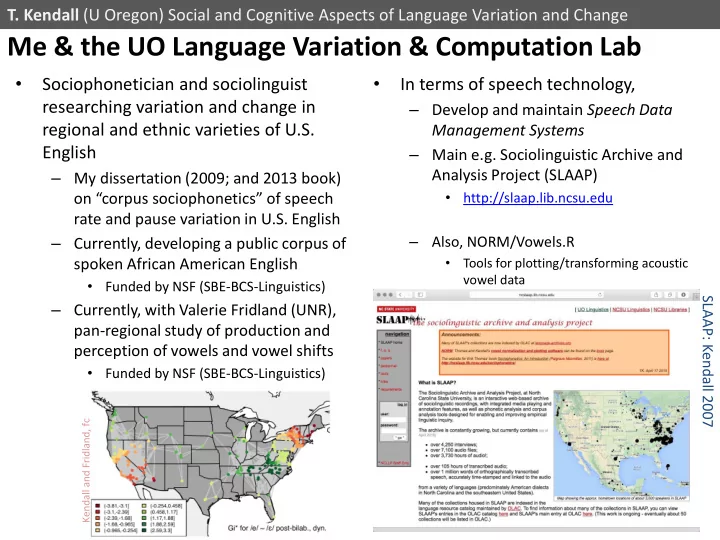

T. Kendall (U Oregon) Social and Cognitive Aspects of Language Variation and Change Me & the UO Language Variation & Computation Lab • • Sociophonetician and sociolinguist In terms of speech technology, researching variation and change in – Develop and maintain Speech Data regional and ethnic varieties of U.S. Management Systems English – Main e.g. Sociolinguistic Archive and – My dissertation (2009; and 2013 book) Analysis Project (SLAAP) • on “ corpus sociophonetics ” of speech http://slaap.lib.ncsu.edu rate and pause variation in U.S. English – – Currently, developing a public corpus of Also, NORM/Vowels.R • spoken African American English Tools for plotting/transforming acoustic vowel data • Funded by NSF (SBE-BCS-Linguistics) SLAAP: Kendall 2007 – Currently, with Valerie Fridland (UNR), pan-regional study of production and perception of vowels and vowel shifts • Funded by NSF (SBE-BCS-Linguistics) Kendall and Fridland, fc
T. Kendall (U Oregon) Social and Cognitive Aspects of Language Variation and Change How does my field impact speech technology? • • Primary research questions: Existing … – How does language variation & change – State of the art = forced-aligned and relate to social and cognitive factors? probabilistic formant extraction FAVE: • Primary questions for speech Rosenfelder technology: et al. 2011) – How can we discover/identify/analyze sound change in progress? – How do we differentiate important variation from unimportant variation (noise)? • Also, Prosodylab aligner (Gordon et – How do we find/assess relevant data? al. 2011) – Existing tools and foci indicate that sociolinguists are – Frontier?? = completely automated looking for cheap/automatic time-aligned transcription and ability to acquire “ analytic data ” quickly/cheaply. vowel extraction • DARLA: Largely, sociolinguists are (avid?) users of speech technology but rarely creators Reddy & EXCEPTIONS Stanford – Most work uses Praat (Boersma & 2015 Weenink 2001-2015) for manual/semi- automatic analysis.
T. Kendall (U Oregon) Social and Cognitive Aspects of Language Variation and Change What challenges do we face to impact ST? • Much sociolinguistic/variationist data are non-standard (“unconventional corpora” Beal et al. 2007) • The features of interest are in flux and (can be) dialect dependent – E.g. Northern Cities shifted vowels, the low back merger in American English • Preexisting speech models don’t match varieties under examination • Interested in speaker characteristics and not just speech • Our solutions are somewhat overly specific (to question at hand) and may not apply to new datasets or new questions – E.g. FAVE is state of the art, but still has limitations • It uses a sample of American English (from ANAE) as its reference… • Again, sociolinguists are generally (relatively naïve) users of speech technology
T. Kendall (U Oregon) Social and Cognitive Aspects of Language Variation and Change What challenges do we face to impact or use ST? • Lots of diverse data – SLAAP contains > 4,000 interviews, > 3,700 hours of speech – But individual projects ( ≈ varieties) can be as small as ~6 interviews • My bias is on the archive/data management side: – No uniform guidelines/standards for data/metadata • NSF & other “ data management ” guidelines are improving things … – No interoperability between “ archives ” and low discoverability • Most “ archives ” are researchers ’ desktop computers • Conventional tools often have unknown error rates/types for non- standard speech • Logistical challenges include: – Lack of technical expertise within sociolinguistics (some exceptions) – To use ST but also just to understand ST possibilities or to articulate questions – Low interest by speech technologists in sociolinguistic projects(??) or more likely a large disciplinary divide between sociolinguistics and speech technology Can speech technologists educate this and other (potential?) user populations?
T. Kendall (U Oregon) Social and Cognitive Aspects of Language Variation and Change A sociolinguistic/sociophonetic wish-list? • What would ideal speech technologies look like from a sociolinguistic perspective? • Again, bias on the archive side: searchable (by metadata and by content/feature) interoperable distributed archives – Improved sociolinguistic archiving could represent a huge boon to speech technology, NLP, etc. in that it massively ramps up the amount and diversity of speech data available for R & D, representing a range of real-world speech types • Searchable = acoustic landmark detection for speech features – E.g.: “ I want to find young Southern males with high rates of consonant cluster reduction ” or “ What rates of consonant cluster reduction do young Southern males exhibit? ” • Transcription “ on the fly ” (ish) – Requires flexible ASR/language models robust to disfluent, conversational speech – Also could provide relatively cheap assessments of ST success rates • E.g. Researchers could approve/disapprove or hand-correct transcripts to improve speech technology systems as a part of their own research
Recommend
More recommend